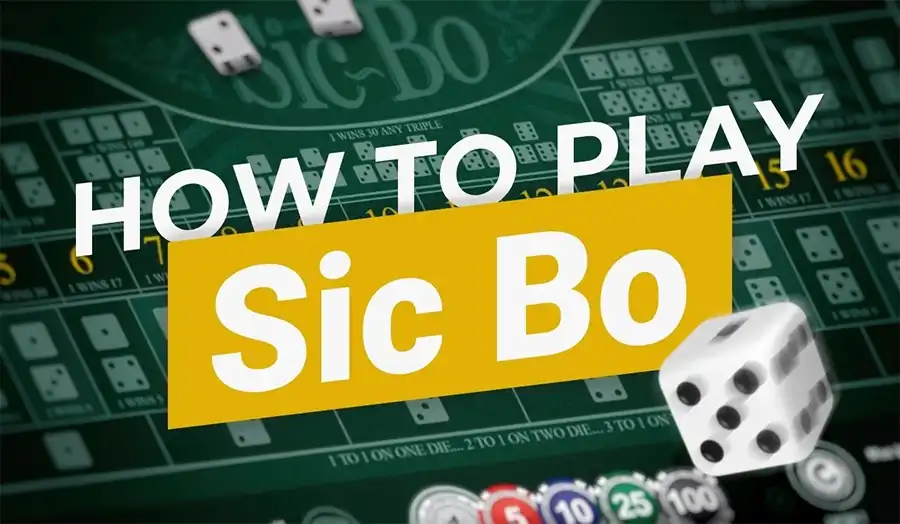Ronaldinho is among the most adored footballers in history. With his signature smile and superb technique, he has won over millions of fans around the world. But the question "When did Ronaldinho start playing soccer?" takes us back to the early days of the Brazilian legend. Born in Porto Alegre, Ronaldinho began his career in street football and futsal, where he developed his unique dribbling skills. In 1998, he made his professional debut for Grêmio at the age of 17. He then quickly rose to the top in Europe, playing for PSG, Barcelona, and AC Milan before returning to his homeland. Ronaldinho's journey is not only about trophies but also about inspiring the next generation of players. Let's find out with Wintips about the story behind this beloved Brazilian footballer!
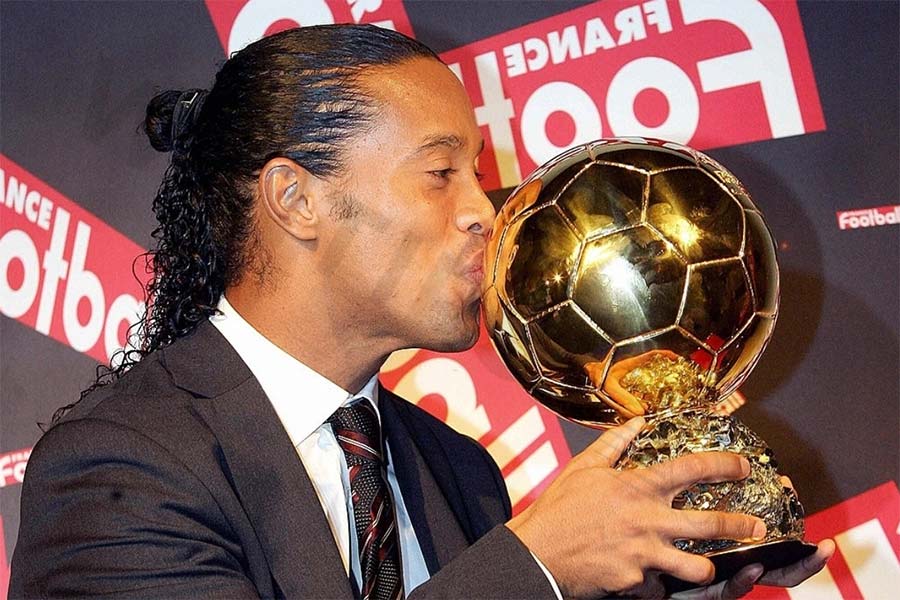
Introduction
Many footballers have made it to the big stage, including Argentine star Lionel Messi and Portuguese striker Cristiano Ronaldo. But only a few have touched people's hearts the way Ronaldinho Gaúcho has.
From the streets of Brazil to the world's most iconic stadiums, Dinho has experienced a life and career full of ups and downs. From tasting ultimate glory with the national team to ending his glittering career, the Brazilian has always found a reason to smile, regardless of the circumstances. He has also brought smiles to millions of fans.
Ronaldinho's quick facts and personal life
Ronaldo de Assis Moreira, widely recognized as Ronaldinho or Ronaldinho Gaúcho, is a retired Brazilian footballer who excelled as an attacking midfielder. Known for his dribbling and free-kick-taking abilities, he is widely regarded as one of the greatest players of all time.
After rising through the ranks at Brazilian club Grêmio, he went on to play for Paris Saint-Germain, FC Barcelona, AC Milan, Flamengo, Atlético Mineiro, Querétaro, and Fluminense.
He has also earned numerous caps for the Brazil national team, with whom he won a FIFA World Cup. As a former Ballon d'Or winner, Ronaldinho has overcome numerous challenges to reach the top. He has always maintained a strong bond with his family.
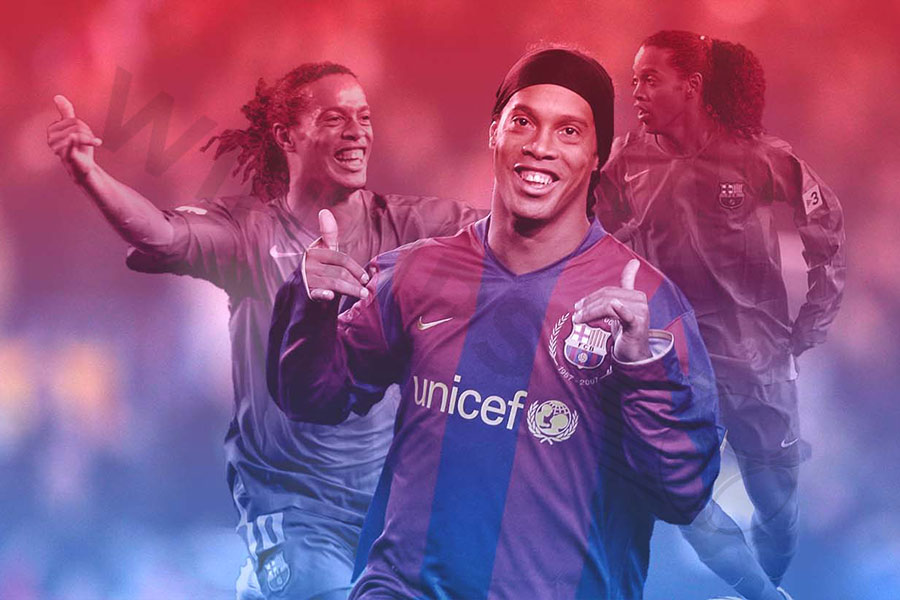
- His full name is Ronaldo de Assis Moreira.
- Born on March 21, 1980, he hails from Porto Alegre, the capital of Rio Grande do Sul, Brazil.
- He is the son of Dona Miguelina Elói Assis dos Santos, a saleswoman who studied to become a nurse, and João de Assis Moreira, a shipyard worker and former footballer.
- His brother, Roberto de Assis, is his agent, and his sister, Deisi de Assis Moreira, is his press coordinator.
- Ronaldinho has a son, João, named in honor of his late father.
- He was married to Janaina Mendes, João’s mother, from 2004 to 2007.
- He has been in relationships with several women, but he denied reports that he was going to marry two women at the same time in 2018.
Ronaldinho's childhood
A tragic loss
Before becoming a global superstar, Ronaldo had to overcome adversity from an early age. Born and raised in one of the most dangerous areas of Porto Alegre, Ronaldinho faced many challenges in his early life. His family moved to a nicer part of the city when his older brother, Roberto, signed for Grêmio.
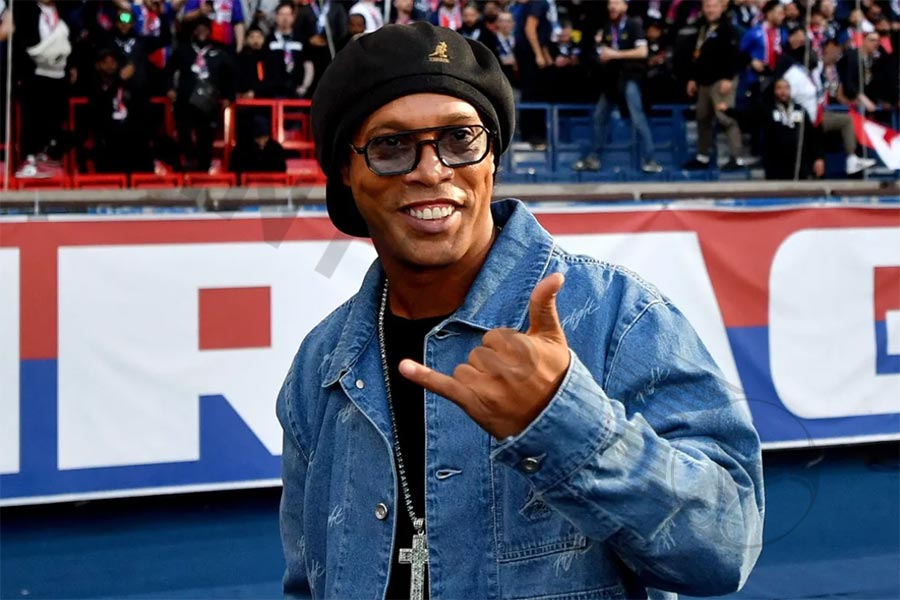
Unfortunately, his new home also brought one of the most tragic moments of his life. When Ronaldo was just eight years old, his father, João, tragically passed away after suffering a head injury and drowning in a swimming pool. His older brother, Roberto, who was nine years his senior but still a teenager, sacrificed his footballing dreams to support his family.
From Futsal to the Pitch
Roberto's sacrifice helped his younger brother find his way in football. As he was often the youngest player wherever he played, he earned the nickname "Ronaldinho." As a child, he played futsal and beach soccer and later brought his signature moves to organized football.
Reliable football tips can help improve your betting success
Ronaldinho's early years and career beginnings
Professional debut with Gremio (1998)
Like his older brother Roberto, Ronaldinho signed his first contract with Grêmio. It didn't take long for him to make his first-team debut, as he was brought on as a 17-year-old in a Copa Libertadores match in 1998. The following year, he had a breakthrough season, scoring 58 goals and providing 20 assists in 121 games, attracting interest from Europe's top clubs.
Moving to Europe (2001)
Arsenal nearly signed the Brazilian talent, but the transfer fell through due to paperwork complications. At the time, Ronaldinho didn't have enough international caps to qualify for the work permit, which a non-EU player needs. However, his first big break was just around the corner, as Paris Saint-Germain was able to sign him.
Ronaldinho's Career
Club Career
Paris Saint-Germain (2001-2003)
PSG was the first European club to take a chance on the rising Brazilian midfielder. Ronaldinho signed a five-year contract with the French club, which paid €5 million for his services. Although he put up great numbers in his first year in France, scoring 13 goals and providing 7 assists in 40 appearances, PSG's then-coach Luis Fernandez complained about Ronaldinho's lack of commitment.
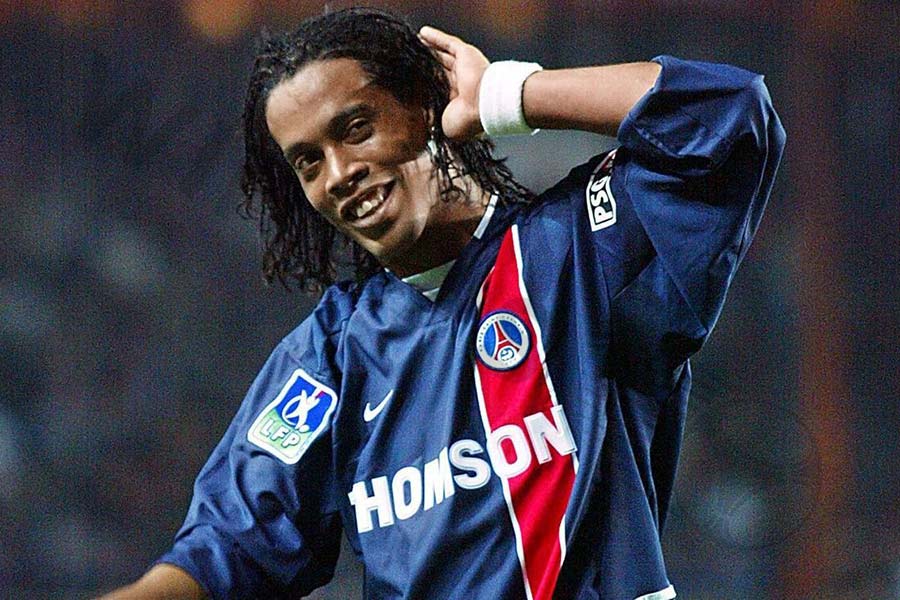
Despite this, Dinho was handed the number 10 shirt the following season. His results were similar to the previous year, only this time he helped Paris reach the Coupe de France final. However, his performances were not enough to win the trophy, and the team failed to qualify for a European tournament. As a result, he decided to leave.
FC Barcelona (2003-2008)
FC Barcelona outbid Manchester United to sign Ronaldinho for €32.25 million. Ronaldinho signed a five-year deal with the Spanish giants, which turned out to be the best decision of his career. After winning his first La Liga title and FIFA World Player of the Year in his second season, Ronaldinho reached his prime in the 2005-06 season.
That year—in which he scored a career-best 26 goals—Ronaldinho established himself as the best player in the world. He reached a level at which Barcelona won La Liga and the Champions League, and even Real Madrid fans applauded him during an El Clásico. On top of that, Dinho won the 2006 Ballon d'Or and the UEFA Club Footballer of the Year after leading Barça to their first UEFA Champions League title in 14 years.
He put up similar numbers the following year, but his time at Barcelona was short-lived. Ronaldinho barely played in an injury-plagued final year at the club, which saw the rise of Lionel Messi. Dinho was said to have lost the commitment he had shown in the previous three seasons, but he left with great memories regardless.
AC Milan (2008-2011)
The Brazilian icon moved to Italian powerhouse AC Milan, but his time there was not as successful as his spell with Barça. After a rather dismal first season with the Rossoneri, Dinho returned to his best form in 2009-10, becoming the top assist provider in Serie A. He departed the club halfway through the next season, during which Milan claimed the title.
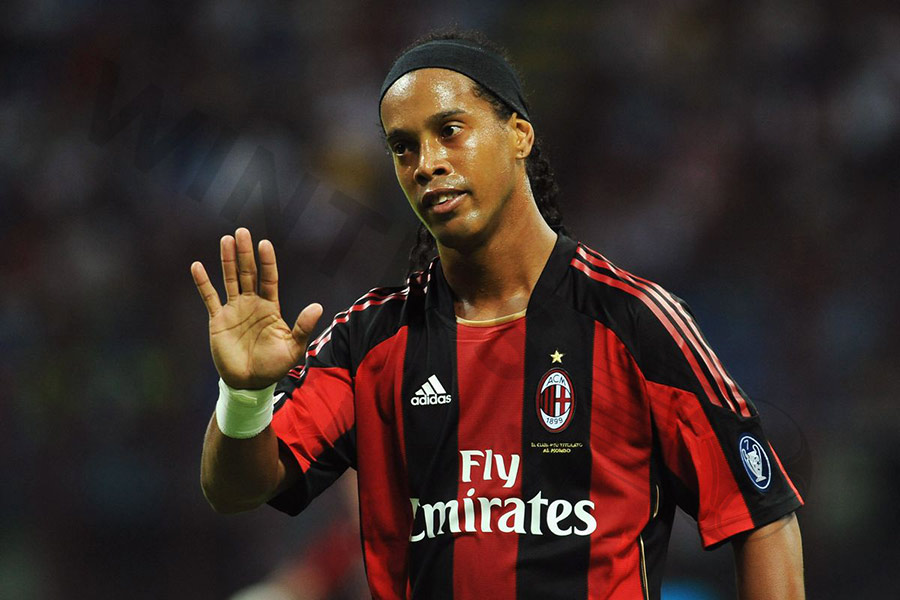
Return to Brazil: Fla mengo (2011-2012)
At the age of 31, Ronaldinho's time in Europe came to an end. With the 2014 World Cup approaching, Dinho returned to Brazil with the aim of gaining enough playing time to become part of the national team.
Rather than rejoining his former club Gremio, Ronaldinho signed for Flamengo. Although he made a great start, winning the Campeonato Carioca in his first year at the club, he was let go due to four months of unpaid wages.
Atlético Mineiro (2013–14)
His next destination was Atlético Mineiro, where he signed on a six-month contract. With the number 10 already taken, he chose 49 in honor of his mother's birth year. After an impressive 2012 Brasileirao campaign that saw him win the club's Player of the Year award, he led the team to their first Copa Libertadores title in 2013.
Mineiro was then beaten by Raja Casablanca in the semi-finals of the 2013 FIFA Club World Cup, but Ronaldinho was given a contract extension. However, his stay was short-lived, as he left in July 2014 after winning the Recopa Sudamericana.
Querétaro (2014-2015)
At 34, he made a shocking move to Liga MX side Querétaro. Ronaldinho felt the love of the Mexican people, which made his time in the country enjoyable. In addition to being admired off the field, he also led his team to the 2015 playoff final.
Fluminense (2015)
Ronaldinho returned to his homeland in July 2015 to play for Fluminense. However, just two months later, his contract was terminated by mutual agreement. Sporting director Mario Bittencourt stated that Dinho admitted himself that he could not play the way he wanted.
Brazil National Team Career
Rising to the International Stage
He made his youth international debut at 15 in 1995, and his first success came with the U-17 team at the 1997 World Cup in Egypt. He earned his first senior call-up on 26 June 1999 and went on to win the Copa America that year.

Ronaldinho continued his progress with the national team by becoming the center of attention at the 1999 FIFA Confederations Cup, finishing as the tournament's top scorer. The following year, he led the U-23s to the 2000 Olympic Games, scoring nine goals in seven matches in the pre-Olympic competition. Brazil failed to make it past the quarter-finals in Sydney, but their glory days were yet to come.
World Cup success in 2002
Forming a potent attacking trio with world-class striker Ronaldo and superstar Rivaldo, Ronaldinho enjoyed a memorable run at the 2002 Korea-Japan World Cup, where he was instrumental in Brazil's success. When his team trailed England in the quarter-finals, Dinho was involved in two goals that turned the game around. He also received a red card that day, but it ultimately had little impact on the outcome.
International decline
Although he shone in another Confederations Cup in 2005, Ronaldinho would never reach the same heights with the national team again. Despite the hype surrounding him and the Brazilian Joga Bonito style promoted by Nike ahead of the 2006 World Cup, Dinho's performances in Germany left much to be desired. Brazil lost to France in the quarter-finals, and from that moment on, Ronaldinho's career was never the same.
After captaining the Olympic team to bronze at Beijing 2008, Ronaldinho was overlooked for the next two FIFA World Cups before retiring. Overall, it was still a fine international career, with 33 goals in 97 appearances.
Why did Ronaldinho stop playing football?
After playing futsal in India for several years, Ronaldinho announced his retirement on January 16, 2018, via his brother and agent Roberto. At nearly 38 years old, he felt he had nothing more to achieve.
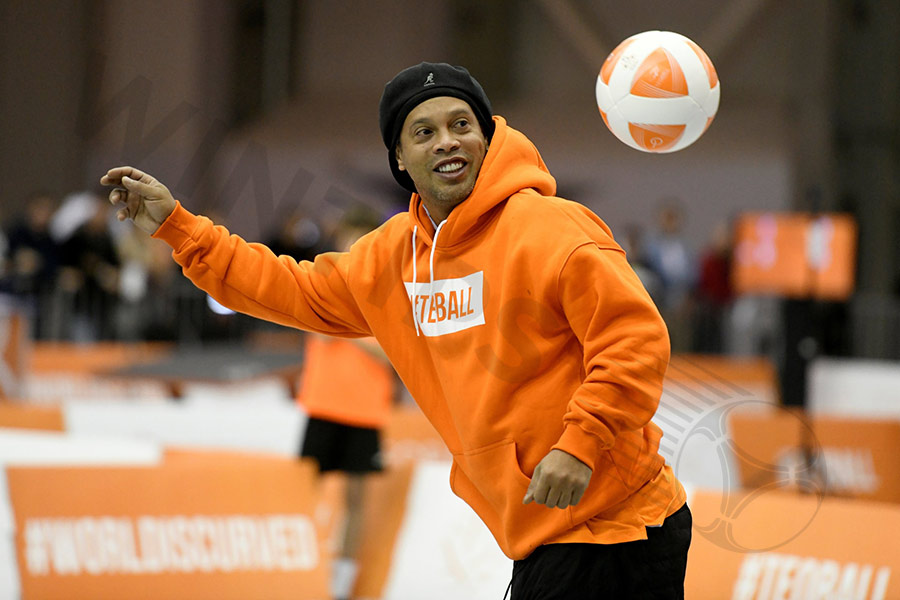
How many awards has Ronaldinho won?
Ronaldinho has one of the most decorated resumes imaginable. He has had success with the national team. He has also tasted glory at the club level, and his great performances have earned him prestigious individual awards.
Club Title
Gremio (Grêmio)
- Copa de la Mestalla: 1999
- Gaúcho Championship: 1999
Barcelona
- Spanish National Championship: 2004–05, 2005–06
- Spanish Super Cup: 2005, 2006
- UEFA Champions League: 2005–06
AC Milan
National Championship: 2010–11
Flamengo
Carioca Championship: 2011
Atlético Mineiro
- Mineiro Championship: 2013
- Copa Libertadores: 2013
- Recopa Sudamericana: 2014
Brazil National Team Titles
- 1997: South American U-17 Championship
- 1997: FIFA U-17 World Cup
- 2000: CONMEBOL Pre-Olympic Tournament
- Olympic Bronze Medal: 2008
- South American Cup: 1999
- FIFA World Cup: 2002
- FIFA Confederations Cup: 2005
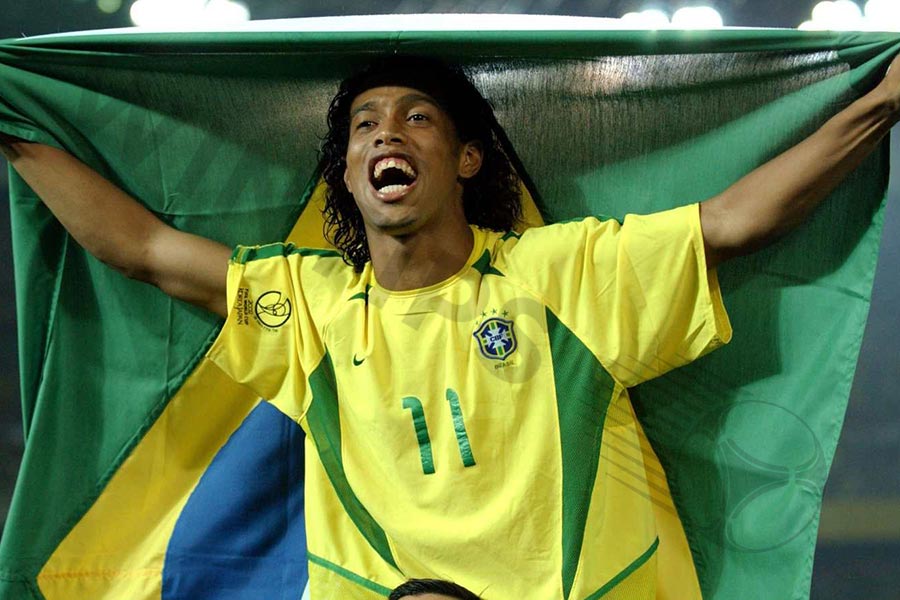
Individual Awards
- Cameonato Gaucho Top Scorer: 1999
- 1999: FIFA Confederations Cup Golden Ball
- 1999: FIFA Confederations Cup Golden Boot
- 1999: South American Team of the Year
- 2000CONMEBOL Pre-Olympic Tournament Top Scorer
- 2000, 2011, 2012: Bola de Prata
- 2002: FIFA World Cup All-Star Team
- 2003: Ligue 1 Goal of the Year
- Don Balón Award: 2003–04, 2005–06
- 2004, 2005: FIFA World Player of the Year
- 2004, 2005, 2006: UEFA Team of the Year
- Ballon d'Or: 2005
- Best Player FIFPro World XI: 2005, 2006
- 2005, 2006, 2007: FIFPro World XI
- UEFA Player of the Year: 2005–06
- La Liga Top Assist Player: 2005–06
- UEFA Champions League Top Assist Player: 2005–06
- Serie A Top Assist Player: 2009–10
- Campeonato Brasileiro Série Team of the Year: 2011, 2012
- Campeonato Brasileiro Série Fan Favorite Player: 2012
- Campeonato Brasileiro Série Top Assist Provider: 2012
- Ouro Football: 2012
- Copa Libertadores Top Assist Player: 2012, 2013
- Top Goalscorer FIFA Club World Cup: 2013
- 2013: South American Footballer of the Year
- Brazilian Football Museum Hall of Fame
- AC Milan Hall of Fame
Conclusion
Ronaldinho is one of the greatest players ever to play football, leaving an indelible mark on the game with his superb technique and infectious smile. His journey began on the streets of Brazil, where his passion for football was nurtured from a young age. When asked when Ronaldinho started playing soccer, the answer is from his childhood, when he played futsal and beach soccer before joining the Grêmio academy. His natural talent helped him quickly reach the top, winning major titles at both club and international levels. Though retired, Ronaldinho's legacy endures, reminding fans of a legend who brought joy and inspiration to football.
